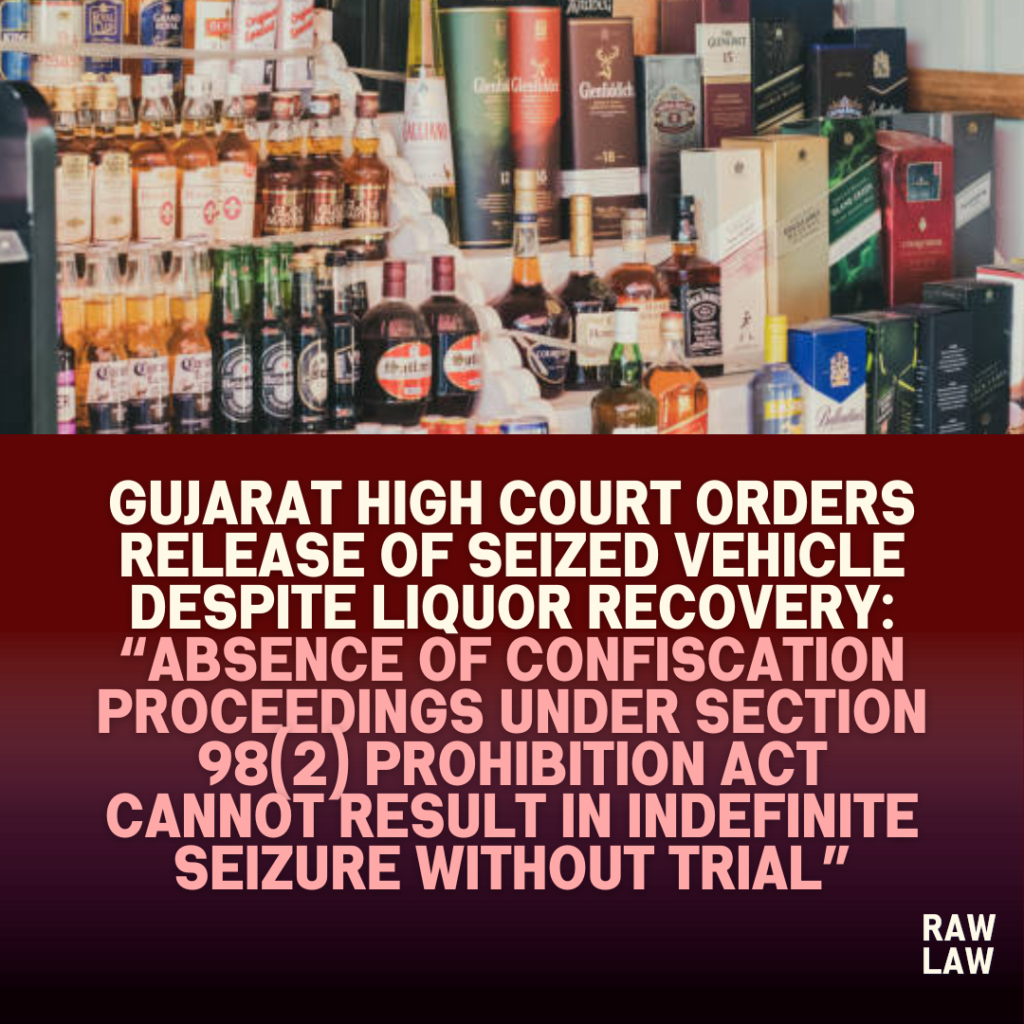Court’s Decision
The Gujarat High Court directed the release of a seized vehicle involved in a liquor-related offence under the Gujarat Prohibition Act. The Court held that despite the quantity of liquor exceeding the permissible limit under Section 98(2), the vehicle could not be indefinitely kept in custody as no confiscation or auction proceedings were initiated. The Court invoked its jurisdiction under Article 226 of the Constitution to allow the release of the muddamal vehicle subject to stringent conditions.
Facts
The petitioner, through his Power of Attorney holder, approached the Gujarat High Court seeking release of his Maruti Swift ZXI vehicle seized in connection with a liquor seizure during patrolling by the police. The police, acting on secret information, intercepted the vehicle and found liquor stored without a valid permit. Consequently, an FIR was registered at Velavadar Bhal Police Station under the Gujarat Prohibition Act.
Issues
- Whether the seized vehicle, used for transporting prohibited liquor, should be released to the petitioner pending trial.
- Whether the absence of confiscation proceedings under Section 98(2) of the Gujarat Prohibition Act affects the continued detention of the vehicle.
Petitioner’s Arguments
The petitioner submitted that under Article 226 of the Constitution, the High Court possesses wide powers to order interim custody of vehicles. Reliance was placed on the Supreme Court judgment in Sunderbhai Ambalal Desai v. State of Gujarat, AIR 2003 SC 638, where the Apex Court disapproved the practice of keeping vehicles idle in police custody leading to deterioration.
Respondent’s Arguments
The State opposed the petition stating that although the Court has the jurisdiction, this was not a fit case for exercising such discretion. It was argued that since the quantity of seized liquor exceeded 20 litres, the vehicle was liable to be confiscated under Section 98 of the Prohibition Act, and thus, should not be released.
Analysis of the Law
The Court analysed the Gujarat Prohibition Act’s provisions, especially Sections 98, 123, and 132(a), along with Section 497 of the Bharatiya Nagarik Suraksha Sanhita, 2023 (corresponding to Section 451 CrPC). The Court emphasized that under Section 98(2), amended on 31.07.2024, confiscation of vehicles is contingent upon initiation of proceedings, which was lacking in the present case.
Precedent Analysis
- Sunderbhai Ambalal Desai v. State of Gujarat [(2002) 10 SCC 283] – The Court reiterated that vehicles should not remain in police custody leading to damage; interim custody must be considered.
- Khengarbhai Lakhabhai Dambhala v. State of Gujarat [2024 INSC 285] – Cited to highlight the need for proper initiation of confiscation proceedings under amended Section 98(2).
Court’s Reasoning
The Court found that no steps were taken by the authority to initiate confiscation or auction under the amended Section 98(2) of the Prohibition Act. As such, retaining the vehicle indefinitely without any statutory action would lead to unnecessary deterioration of property. It held that the lower courts rightly denied interim custody earlier, but the continued inaction now warranted judicial intervention.
Conclusion
The petition was allowed. The Trial Court was directed to release the vehicle to the petitioner on the following conditions:
- A solvent surety equal to the value of the vehicle.
- Undertaking not to alter or transfer the vehicle.
- Production of vehicle when required.
- Compliance with future confiscation or auction proceedings.
- Confiscation in case of subsequent offence.
- Trial Court and RTO to ensure necessary verification and procedural compliance before release.
Implications
This ruling reinforces that failure to act under confiscation provisions of the Prohibition Act cannot justify indefinite retention of a seized vehicle. The judgment balances statutory rigour with property protection, guiding future cases involving seizure without follow-through.
Judgments Cited and Their Relevance
- Sunderbhai Ambalal Desai v. State of Gujarat [(2002) 10 SCC 283] – Emphasized interim custody and prevention of property decay.
- Khengarbhai Lakhabhai Dambhala v. State of Gujarat [2024 INSC 285] – Referenced to affirm importance of compliance with amended Section 98(2) for lawful confiscation.
FAQs
Q1. Can a vehicle seized under the Prohibition Act be released during trial?
Yes, if no confiscation proceedings are initiated under Section 98(2), the High Court can order interim custody subject to conditions.
Q2. What is the relevance of Sunderbhai Ambalal Desai in such cases?
It lays down that vehicles should not remain idle in police custody and deteriorate but may be released conditionally to prevent loss of property.
Q3. Is release automatic if confiscation is not initiated?
Not automatic, but courts may allow it if there’s no evidence of legal proceedings under Section 98(2) and if the case facts support such discretion.



